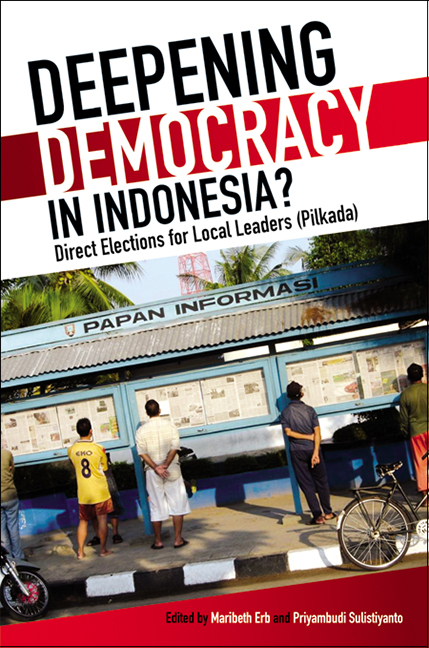Book contents
- Frontmatter
- Dedication
- Contents
- List of Tables
- List of Figures
- Contributors
- Acknowledgements
- Glossary
- 1 Indonesia and the Quest for “Democracy”
- 2 Pilkada Langsung: The First Step on the Long Road to a Dualistic Provincial and District Government
- Part I Political Parties, Politician Elites and the Voters
- 3 Political Parties in Pilkada: Some Problems for Democratic Consolidation
- 4 Batam's 2006 Mayoral Election: Weakened Political Parties and Intensified Power Struggle in Local Indonesia
- 5 The Rising Importance of Personal Networks in Indonesian Local Politics: An Analysis of District Government Head Elections in South Sulawesi in 2005
- 6 Pilkada, Money Politics and the Dangers of “Informal Governance” Practices
- 7 Electing District Heads in Indonesia: Democratic Deepening or Elite Entrenchment?
- 8 Gender and Reform in Indonesian Politics: The Case of a Javanese Woman Bupati
- 9 Pilkada in Bantul District: Incumbent, Populism and the Decline of Royal Power
- Part II Media and Campaigns: Comparing Local and National Elections
- Part III Conflict, Ethnicity, and Political Divisions
- Index
8 - Gender and Reform in Indonesian Politics: The Case of a Javanese Woman Bupati
from Part I - Political Parties, Politician Elites and the Voters
Published online by Cambridge University Press: 21 October 2015
- Frontmatter
- Dedication
- Contents
- List of Tables
- List of Figures
- Contributors
- Acknowledgements
- Glossary
- 1 Indonesia and the Quest for “Democracy”
- 2 Pilkada Langsung: The First Step on the Long Road to a Dualistic Provincial and District Government
- Part I Political Parties, Politician Elites and the Voters
- 3 Political Parties in Pilkada: Some Problems for Democratic Consolidation
- 4 Batam's 2006 Mayoral Election: Weakened Political Parties and Intensified Power Struggle in Local Indonesia
- 5 The Rising Importance of Personal Networks in Indonesian Local Politics: An Analysis of District Government Head Elections in South Sulawesi in 2005
- 6 Pilkada, Money Politics and the Dangers of “Informal Governance” Practices
- 7 Electing District Heads in Indonesia: Democratic Deepening or Elite Entrenchment?
- 8 Gender and Reform in Indonesian Politics: The Case of a Javanese Woman Bupati
- 9 Pilkada in Bantul District: Incumbent, Populism and the Decline of Royal Power
- Part II Media and Campaigns: Comparing Local and National Elections
- Part III Conflict, Ethnicity, and Political Divisions
- Index
Summary
INTRODUCTION: WOMEN IN INDONESIAN POLITICS
It is often stated that an important feature for the consolidation of democracy is the inclusion of the marginalized into the decision-making process; one of the marginalized groups often cited is women (Chusnul Mari'yah 2002; Haynes 2001, p. 10). Indeed, in the process of reform that started in Indonesia with the fall of Soeharto in 1998, the inclusion of women has been one of the stated goals. Some women activists argue that “Democracy without the involvement of women is not democracy” (Chusnul Mari'yah 2002, p. 4). A quota of 30 per cent inclusion of women politicians, for both the representatives (DPR) and the local district leaders (bupati), was formulated as a goal in the legislative elections of 2004. Although there was pressure from women's groups to implement this quota, it was in the end decided that it would be encouraged, but not required. Since it was not mandatory, nowhere was a 30 per cent rate of female political participation met, and there has been both passive and active resistance to the wider inclusion of women in politics in Indonesia. In this chapter I want to examine one case of a woman who has made her name in local politics in Indonesia, Rustriningsih, the bupati of Kebumen District in Central Java, and examine what her election has meant to reform and the consolidation of democracy in Indonesia.
Under the New Order there were several women bupati in Indonesia. But as Hana Satriyo notes:
Women's political participation reached its lowest point during the New Order period. The strong central government in Jakarta was able to intervene in the activities of all formal and informal political institutions, at both the national and local level. As part of its tight control over political parties and national and local parliaments, the Soeharto administration made sure that most women politicians were appointed on the basis of their connections with prominent and politically powerful men. The limitations on women's political participation were even greater at the local than at the national level. Structural barriers (such as party regulations) preventing women from entering local political institutions worked hand in hand with patriarchal values to discourage women from taking up public positions and participating in public affairs (Satriyo, 2003, p. 219).
- Type
- Chapter
- Information
- Deepening Democracy in Indonesia?Direct Elections for Local Leaders (Pilkada), pp. 174 - 189Publisher: ISEAS–Yusof Ishak InstitutePrint publication year: 2009



